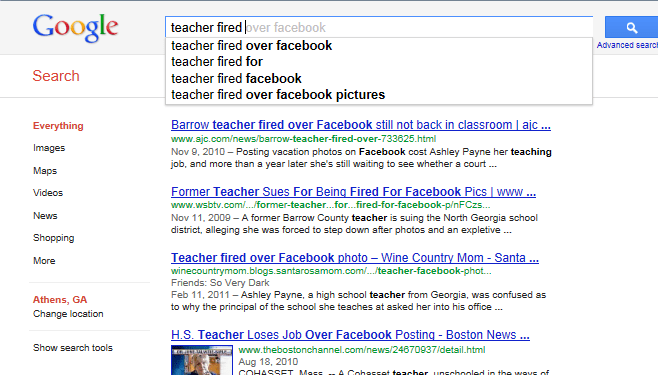By ALEXA FRIEDMAN– Viewpoints Editor
Teacher fired over Facebook. Teacher fired over Facebook comments. Teacher fired for blog. Teacher fired over Facebook pictures.
These are the first links displayed when “teacher fired” is typed into the Google search box, which yields suggestions of related and most popularly searched items.
The Internet is a porthole for creative expression and allows us so much freedom and global connection. Society isn’t ready to deal with what comes with all of this power or to define what constitutes overstepping boundaries of expression via the Internet.
The issue of teachers being fired over trivial Facebook problems nationwide was brought closer to home when a former high school teacher from Apalachee High School in Winder, Ga., was recently fired over a picture on her personal Facebook account.
She was not doing anything illegal — she was holding alcohol, but she was of the legal drinking age and none of her students had access to her profile. There is confusion about where freedom of expression becomes inappropriate behavior.
While some people suffer from online expression, others actually receive praise for their Internet use. For example, the Huffington Post is an online blog for professionals to post about their fields of study.
And while there is still so much negative said for students’ use of the Internet in the media, a study conducted in Spring 2011 by the John S. and James L. Knight Foundation, which surveyed 12,090 students showed that there is a positive correlation of students who use the Internet more often and a higher appreciation for the first amendment.
In another part of the study, 900 teachers nationwide were surveyed and results actually showed that “many teachers believe social media harms education.” Only 35 percent of teachers agreed with the statement that “high school students should be allowed to report controversial issues in their student newspapers without the approval of school authorities.”
Perhaps the teachers are afraid for their jobs, or maybe teachers with the negative opinion were those who were fired for exercising their basic rights who believed in students having the freedom to report controversial issues. The teachers I’ve had certainly haven’t stopped me from expressing my opinions — maybe I’ve taken that for granted.
The Internet has a more positive effect on students than we give it credit for.
For instance, countless rallies have spread because of Internet coverage and communication via social media. Most recently, the Internet allowed University of Georgia students to become aware of the Occupy Wall Street protest, involving protests against corporations and government. Athens rallies have centered at the iconic Arch.
Students take advantage of the Internet in positive ways, but aren’t recognized for it often enough. Let’s face it, what’s more of a ground-breaking story: students doing something powerful to fix the problems they see by using the Internet to share and gain knowledge, or a politician who uploaded nude photos?
There are good and bad consequences resulting from the Internet, but if we focus on putting the bad on a pedestal, we can’t foster the educational opportunities that come from the Internet and build off of a strong, positive foundation.
